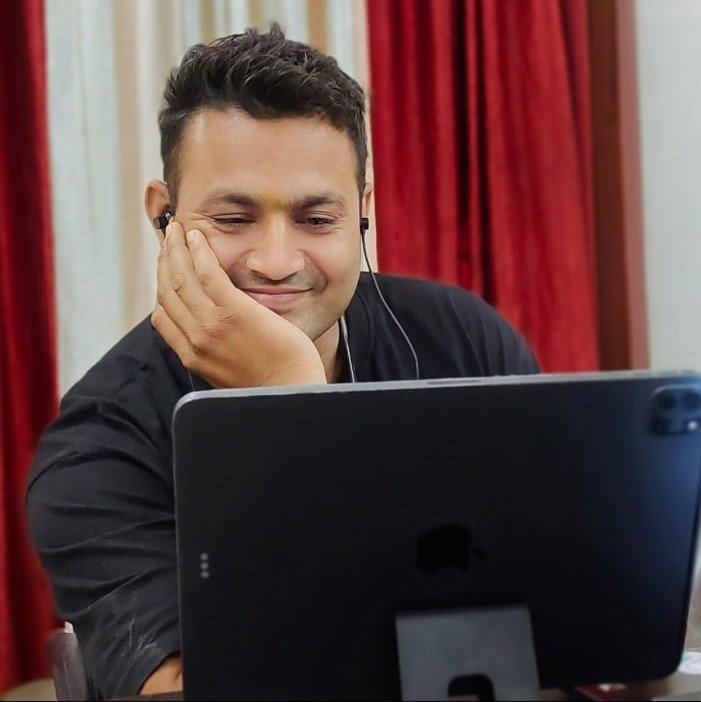Best C++ Programming Course in Jaipur, Rajasthan at Groot Academy
Welcome to Groot Academy, Jaipur's premier institute for IT and software training. We are proud to offer the best C++ Programming Course in Jaipur, Rajasthan. Whether you are a beginner or looking to enhance your skills, our comprehensive course is designed to provide you with the knowledge and hands-on experience needed to excel in the world of programming.
Course Overview:
Are you ready to become an expert in C++ programming? Join Groot Academy's best C++ Programming course in Jaipur, Rajasthan, and transform your career in the tech industry.
- 2221 Total Students
- 4.5 (1254 Rating)
- 1256 Reviews 5*
Why Choose Our C++ Programming Course?
- Comprehensive Curriculum: Our course covers everything from the basics of C++ programming to advanced concepts, ensuring a thorough understanding of the language.
- Expert Instructors: Learn from industry experts with years of experience in C++ programming.
- Hands-On Projects: Gain practical experience by working on real-world projects and assignments.
- Career Support: Get access to our extensive network of hiring partners and receive career guidance and placement assistance.
Course Highlights
- Introduction to C++ Programming: Understand the basics of programming and the role of a C++ developer.
- Basic and Advanced C++: Master syntax, functions, classes, objects, inheritance, polymorphism, templates, and exception handling.
- Data Structures and Algorithms: Learn essential data structures and algorithms to optimize your coding skills.
- Memory Management: Understand pointers, dynamic memory allocation, and efficient memory usage.
- Project Work: Apply your knowledge in real-world projects to build a robust portfolio.
Why Choose Our Course:
- Expert Instruction: Our experienced instructors bring real-world knowledge and industry insights to the classroom, guiding you through each concept with clarity and depth.
- Hands-On Projects: Put theory into practice with hands-on projects that simulate real-world scenarios. Develop a strong portfolio that showcases your coding prowess.
- Personalized Learning: We understand that each learner's pace is unique. Our course is designed to accommodate different learning styles and speeds, ensuring you grasp concepts thoroughly.
- Career Relevance: The skills acquired in this course are highly transferable and applicable across various programming domains. Whether you're interested in software development, game design, or application programming, C++ forms a solid foundation.
Who Should Enroll?
- Aspiring programmers
- Developers looking to learn C++ for game development
- Software engineers seeking to upskill
- Entrepreneurs planning to develop their own software
Why Groot Academy?
- Modern Learning Environment: State-of-the-art facilities and resources.
- Flexible Learning Options: Weekday and weekend batches available.
- Student-Centric Approach: Small batch sizes for personalized attention.
- Affordable Fees: Competitive pricing with various payment options.
Enroll Now
Kickstart your journey to becoming a proficient C++ programmer with Groot Academy. Enroll in the best C++ Programming course in Jaipur, Rajasthan, and take the first step towards a rewarding career in tech.
Contact Us
- Phone: +91-8233266276
- Email: info@grootacademy.com
- Address: 122/66, 2nd Floor, Madhyam Marg, Mansarovar, Jaipur, Rajasthan 302020
Instructors

Shivanshi Paliwal
C, C++, DSA, J2SE, J2EE, Spring & Hibernate
Satnam Singh
Software ArchitectA1: In Module 1, you will learn the basics of C++ programming, including syntax, structure, and basic concepts like variables, data types, and simple input/output operations.
A2: No prior programming experience is required. This module is designed for beginners and will cover foundational concepts in C++.
A3: Module 1 typically takes about 1-2 weeks to complete, depending on your learning pace and the course schedule.
A4: Yes, Module 1 includes hands-on exercises to help you apply the concepts you learn.
A5: There are no prerequisites for Module 1. It is designed to start with the basics of C++ programming.
A6: Yes, recommended resources include online tutorials, C++ reference books, and coding practice platforms.
A7: Yes, an introduction to the history and evolution of C++ will be covered in this module.
A8: Module 1 lays the foundation for understanding more advanced topics covered in the subsequent modules.
A9: You will have access to online forums, peer discussions, and instructor support to help you with any questions or issues.
A1: In Module 2, you will learn about different data types in C++, how to declare variables, and how to use them in your programs.
A2: Yes, it is recommended to complete Module 1 to understand the basic concepts of C++ programming.
A3: Module 2 typically takes about 1 week to complete.
A4: Yes, Module 2 includes practical exercises to help you understand data types and variables.
A5: C++ data types include int, float, double, char, bool, and several others.
A6: You will learn to use variables through examples and exercises that involve declaring, initializing, and manipulating them.
A7: Recommended readings include chapters on data types and variables from C++ programming books.
A8: Understanding data types is crucial for effective programming in C++, as it affects how data is stored and manipulated.
A9: Yes, type conversion and type casting will be covered in this module.
A1: In Module 3, you will learn about control structures such as if-else statements, switch statements, loops (for, while, do-while), and how to control the flow of your programs.
A2: Yes, understanding data types and variables is essential before learning control structures.
A3: Module 3 typically takes about 1 week to complete.
A4: Yes, Module 3 includes practical exercises and coding challenges to help you understand control structures.
A5: Control structures are constructs that dictate the flow of control in a program, such as conditional statements and loops.
A6: You will learn through examples, coding exercises, and real-world problem-solving scenarios.
A7: Yes, recommended resources include online tutorials, reference books, and coding platforms focused on control structures.
A8: Control structures are fundamental to programming as they determine the logic and flow of a program.
A9: Yes, you will learn about nesting control structures and how to use them effectively.
A1: In Module 4, you will learn about functions, how to define and use them, and the importance of functions in modular programming.
A2: Yes, a good understanding of control structures is beneficial before learning about functions.
A3: Module 4 typically takes about 1 week to complete.
A4: Yes, Module 4 includes practical exercises and coding projects to help you understand functions.
A5: Functions are blocks of code that perform specific tasks and can be called from other parts of the program.
A6: You will learn through examples, exercises, and coding challenges that involve creating and using functions.
A7: Recommended resources include online tutorials, reference books, and coding platforms focused on functions.
A8: Functions are essential for creating modular, reusable, and maintainable code.
A9: Yes, function overloading and its applications will be covered in this module.
A1: In Module 5, you will learn about arrays and strings, how to use them, and their significance in programming.
A2: Yes, understanding functions is beneficial before learning about arrays and strings.
A3: Module 5 typically takes about 1 week to complete.
A4: Yes, Module 5 includes practical exercises and coding challenges to help you understand arrays and strings.
A5: Arrays are collections of elements of the same type, stored in contiguous memory locations.
A6: You will learn through examples, exercises, and coding challenges that involve manipulating arrays and strings.
A7: Recommended resources include online tutorials, reference books, and coding platforms focused on arrays and strings.
A8: Arrays and strings are fundamental data structures used in many programming applications.
A9: Yes, multi-dimensional arrays and their applications will be covered in this module.
A1: In Module 6, you will learn about pointers and references, their usage, and their significance in C++ programming.
A2: Yes, a good understanding of arrays and strings is beneficial before learning pointers and references.
A3: Module 6 typically takes about 1-2 weeks to complete.
A4: Yes, Module 6 includes practical exercises and coding challenges to help you understand pointers and references.
A5: Pointers are variables that store memory addresses of other variables.
A6: You will learn through examples, exercises, and practice problems involving pointers and references.
A7: Recommended resources include tutorials, reference books, and coding platforms focused on pointers and references.
A8: Pointers and references are crucial for efficient memory management and for advanced programming techniques.
A9: Yes, dynamic memory allocation and its applications will be covered in this module.
A1: In Module 7, you will learn about object-oriented programming (OOP) concepts such as classes, objects, inheritance, polymorphism, encapsulation, and abstraction.
A2: Yes, understanding pointers and references is beneficial before learning object-oriented programming concepts.
A3: Module 7 typically takes about 2 weeks to complete.
A4: Yes, Module 7 includes practical exercises and coding projects to help you understand and apply OOP concepts.
A5: OOP is a programming paradigm based on the concept of "objects", which can contain data and methods to manipulate that data.
A6: You will learn through examples, exercises, and coding projects that involve creating and using classes and objects.
A7: Recommended resources include online tutorials, reference books, and coding platforms focused on OOP concepts.
A8: OOP is essential for designing modular, reusable, and maintainable code, especially for large and complex software systems.
A9: Yes, advanced OOP concepts such as inheritance, polymorphism, and design patterns will be covered in this module.
A1: In Module 8, you will learn about operator overloading, how to define and use overloaded operators, and their significance in C++ programming.
A2: Yes, a good understanding of object-oriented programming is beneficial before learning operator overloading.
A3: Module 8 typically takes about 1 week to complete.
A4: Yes, Module 8 includes practical exercises and coding challenges to help you understand operator overloading.
A5: Operator overloading allows you to redefine the way operators work for user-defined types, making them more intuitive to use.
A6: You will learn through examples, exercises, and coding challenges that involve creating and using overloaded operators.
A7: Recommended resources include online tutorials, reference books, and coding platforms focused on operator overloading.
A8: Operator overloading can make code more readable and intuitive, especially when working with complex data types.
A9: Yes, best practices and guidelines for effective operator overloading will be covered in this module.
A1: In Module 9, you will learn about templates, how to create and use them, and the Standard Template Library (STL) in C++.
A2: Yes, understanding operator overloading and object-oriented programming is beneficial before learning about templates and STL.
A3: Module 9 typically takes about 1-2 weeks to complete.
A4: Yes, Module 9 includes practical exercises and coding challenges to help you understand templates and STL.
A5: Templates allow you to create generic functions and classes that work with any data type.
A6: You will learn through examples, exercises, and coding challenges that involve creating and using templates and STL components.
A7: Recommended resources include online tutorials, reference books, and coding platforms focused on templates and STL.
A8: Templates and STL are essential for writing efficient, reusable, and maintainable code in C++.
A9: Yes, advanced template programming techniques and best practices will be covered in this module.
A1: In Module 10, you will learn about exception handling, how to use try, catch, and throw statements, and the significance of exceptions in robust programming.
A2: Yes, a good understanding of templates and STL is beneficial before learning about exception handling.
A3: Module 10 typically takes about 1 week to complete.
A4: Yes, Module 10 includes practical exercises and coding challenges to help you understand exception handling.
A5: Exception handling is a mechanism for managing runtime errors, allowing you to catch and handle exceptions gracefully.
A6: You will learn through examples, exercises, and coding challenges that involve creating and handling exceptions.
A7: Recommended resources include online tutorials, reference books, and coding platforms focused on exception handling.
A8: Exception handling is essential for writing robust, error-resistant code, especially in complex applications.
A9: Yes, best practices and guidelines for effective exception handling will be covered in this module.
A1: In Module 11, you will learn about file handling, how to read from and write to files, and the significance of file handling in C++ programming.
A2: Yes, a good understanding of exception handling is beneficial before learning about file handling.
A3: Module 11 typically takes about 1 week to complete.
A4: Yes, Module 11 includes practical exercises and coding challenges to help you understand file handling.
A5: File handling involves performing operations such as creating, reading, writing, and closing files in C++.
A6: You will learn through examples, exercises, and coding challenges that involve reading from and writing to files.
A7: Recommended resources include online tutorials, reference books, and coding platforms focused on file handling.
A8: File handling is essential for many applications that involve data storage, retrieval, and manipulation.
A9: Yes, different file formats and their handling will be covered in this module.
A1: In Module 12, you will learn about advanced C++ topics such as multi-threading, networking, and other advanced concepts.
A2: Yes, a good understanding of file handling is beneficial before learning advanced C++ topics.
A3: Module 12 typically takes about 2 weeks to complete.
A4: Yes, Module 12 includes practical exercises and coding projects to help you understand advanced C++ topics.
A5: Advanced C++ topics include multi-threading, networking, advanced template programming, and other advanced concepts.
A6: You will learn through examples, exercises, and coding projects that involve advanced C++ concepts.
A7: Recommended resources include online tutorials, reference books, and coding platforms focused on advanced C++ topics.
A8: Advanced C++ topics are crucial for developing high-performance, scalable, and complex applications.
A9: Yes, C++ design patterns and their applications will be covered in this module.
A1: In Module 13, you will apply the concepts and skills learned throughout the course to a comprehensive project.
A2: Yes, completing all previous modules is essential to have the necessary knowledge and skills for the project work.
A3: Module 13 typically takes about 2-4 weeks to complete, depending on the project's complexity.
A4: Yes, you will receive guidance and feedback from instructors and peers throughout the project work.
A5: You will work on a comprehensive project that integrates various concepts and skills learned throughout the course, typically involving real-world scenarios.
A6: Evaluation will be based on your project's completeness, functionality, code quality, and adherence to the project requirements.
A7: Recommended resources include project management tools, coding platforms, and reference materials relevant to your project topic.
A8: The project work is crucial as it provides an opportunity to apply what you've learned, demonstrate your skills, and create a portfolio piece.
A9: Yes, you will typically be required to present your project to instructors and peers, showcasing your work and explaining your approach and solutions.
Rahul Sharma
Anjali Mehta
Vikram Singh
Priya Kapoor
Arjun Desai
Sanya Gupta
Karan Patel
Neha Choudhary
Rohit Verma
Aisha Khan
Rakesh Jindal
Meera Nair
Devraj Chauhan
Sneha Bhatt
Akshay Joshi
Kavita Rana
Yash Raj
Ananya Das
Sameer Soni
Tanya Agarwal
Get In Touch
Ready to Take the Next Step?
Embark on a journey of knowledge, skill enhancement, and career advancement with
Groot Academy. Contact us today to explore the courses that will shape your
future in IT.


